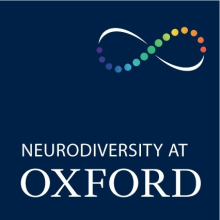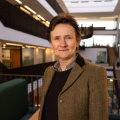
Student Spotlight: Neurodiversity at Oxford
Fourth year DPhil English Literature, Joel Casey from St Anne’s College talks about his experience at Oxford as a neurodivergent student and becoming involved in the Diversity Fund.
It was my third year of my undergraduate English degree when I was diagnosed with dyspraxia and dysgraphia. Seven years later, I am in the fourth year of my DPhil on British silent cinema and my life and study have been transformed by the diagnosis. I now understand how I work and think. I understand that I need more time to process, to formulate ideas and to structure written work. I have an answer, now, when my handwriting is described as ‘bizarre’ as it was in my first year of study! I recognise that my SpLDs also enable me to think in ways unlike neurotypical people which leads to different approaches, ideas and solution.
I reached this point with support from the Disability Advisory Services (DAS), mentors and other neurodivergent friends and family. The sense of community, of recognising that others had similar experiences, discovering that we were not deficient in some way but that our brains worked differently , was fundamental. I have now worked with my study skills tutor Marion for seven years, via the DAS, and we have discussed time management, writing style and structure, and finding my academic voice (and would recommend any neurodivergent students get in touch with the DAS and see what support they can offer you).
When I saw a job advertisement for a role with Neurodiversity at Oxford, an Oxford Diversity Fund initiative due to start in 2021, I was thrilled to get involved. The project aimed to connect neurodivergent members of the university to celebrate and empower staff and students, and would be run entirely by and in collaboration with neurodivergent people. I could play a crucial role in ensuring that others could find the same community and connection with neurodivergent people, recognising their strengths and unique ways of thinking while finding support in overcoming obstacles and difficulties in an academic world traditionally geared towards neurotypicality.
Over the last year, we have put on a series of events exploring neurodiversity and especially the kind of creativity that neurodiversity facilitates. We launched with poet Joanne Limburg who read some of her moving poetry on her experiences as a late-diagnosed autistic woman, and found, in conversation with staff and students, that these experiences resonated with many of the audience. In fact, though I am not autistic and not a woman, I found that my own late diagnosis and the sudden sense my thinking made resonated too. Since then, we have held an exhibition of the paintings of autistic artist Mahlia Amatina and this term, we will be hosting G&T Theatre for a production of ‘Melonade’, an interactive game show highlighting the unfairness of the education system for dyslexic students, and Avi Mendelson for a workshop on Shakespeare and mental health activism. We have launched a blog with regular reflections and book reviews and are in the process of launching a mentoring scheme for neurodivergent students.
It has been centrally important for us to focus on creativity and expression: not only the obstacles and difficulties of neurodiversity but the forms of expression, artistic works, and solidarity among neurodivergent communities. It has also been important to work in collaboration with other students and staff, and I have hugely enjoyed communicating and working with other members of the university, sharing ideas and experiences across disciplines, faculties and even the staff-student divide! While we aimed for accessibility from the beginning, it has been hugely rewarding to receive ideas and constructive criticism from others and this has led to our inclusion of hybrid events accessible online as well as in person, systems for helping people participate in social events, and providing ‘fidgets’ and other stimuli for people who require them.
Over the course of my DPhil, I have become less and less sure of what I want to do in my career. However, I have become more certain that accessibility and neurodiversity will be at the heart of my future, working in collaboration and community with others who can widen my worldview and draw attention to obstacles, experiences and ideas I may never have considered.
We are hoping that the Neurodiversity at Oxford project will continue to provide the same forms of community and connection after this academic year is up. We invite any neurodivergent students or staff with ideas for future events and initiatives to contact us and continue to build this network.
To find out more, please email us where we can tell you more about the project and add you to our mailing list to keep up with our events and initiatives. You can also use our website, follow our Twitter.
We will be hosting Shakespeare scholar, Avi Mendelson for a workshop on ‘Shakespeare and Mad Activism’ at St Anne’s College on 15th June, exploring representations of madness in Shakespeare and how we might think about these in our present moment. More information is available via our website.Booking is not yet open but keep an eye on our website, Facebook and social media pages for further details.

 Student story: From refugee camps to Oxford
Student story: From refugee camps to Oxford
 Transcript: Vice-Chancellor's start of Hilary 2026 student message
Transcript: Vice-Chancellor's start of Hilary 2026 student message
 Transcript: Vice-Chancellor's end of Michaelmas 2025 student message
Transcript: Vice-Chancellor's end of Michaelmas 2025 student message
 Student social media content creator opportunities
Student social media content creator opportunities
 Welfare blog: Advice for care-experienced or estranged students over the winter vacation
Welfare blog: Advice for care-experienced or estranged students over the winter vacation